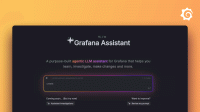This is documentation for the next version of Grafana Alloy Documentation. For the latest stable release, go to the latest version.
loki.source.docker
loki.source.docker reads log entries from Docker containers and forwards them to other loki.* components. Each component can read from a single Docker daemon.
You can specify multiple loki.source.docker components by giving them different labels.
Usage
loki.source.docker "LABEL" {
host = HOST
targets = TARGET_LIST
forward_to = RECEIVER_LIST
}Arguments
The component starts a new reader for each of the given targets and fans out log entries to the list of receivers passed in forward_to.
You can use the following arguments with loki.source.docker:
Blocks
You can use the following blocks with loki.source.docker:
The > symbol indicates deeper levels of nesting.
For example, http_client_config > basic_auth refers to an basic_auth block defined inside a http_client_config block.
These blocks are only applicable when connecting to a Docker daemon over HTTP or HTTPS and has no effect when connecting via a unix:/// socket
http_client_config
The http_client_config block configures settings used to connect to HTTP(S) Docker daemons.
bearer_token, bearer_token_file, basic_auth, authorization, and oauth2 are mutually exclusive, and only one can be provided inside of a http_client_config block.
no_proxy can contain IPs, CIDR notations, and domain names. IP and domain names can contain port numbers.
proxy_url must be configured if no_proxy is configured.
proxy_from_environment uses the environment variables HTTP_PROXY, HTTPS_PROXY, and NO_PROXY (or the lowercase versions thereof).
Requests use the proxy from the environment variable matching their scheme, unless excluded by NO_PROXY.
proxy_url and no_proxy must not be configured if proxy_from_environment is configured.
proxy_connect_header should only be configured if proxy_url or proxy_from_environment are configured.
authorization
The authorization block configures custom authorization to use for the Docker daemon.
credential and credentials_file are mutually exclusive, and only one can be provided inside an authorization block.
Warning
Using
credentials_filecauses the file to be read on every outgoing request. Use thelocal.filecomponent with thecredentialsattribute instead to avoid unnecessary reads.
basic_auth
The basic_auth block configures basic authentication for HTTP(S) Docker daemons.
password and password_file are mutually exclusive, and only one can be provided inside a basic_auth block.
Warning
Using
password_filecauses the file to be read on every outgoing request. Use thelocal.filecomponent with thepasswordattribute instead to avoid unnecessary reads.
oauth2
The oauth2 block configures OAuth 2.0 authorization to use for the Docker daemon.
client_secret and client_secret_file are mutually exclusive, and only one can be provided inside an oauth2 block.
Warning
Using
client_secret_filecauses the file to be read on every outgoing request. Use thelocal.filecomponent with theclient_secretattribute instead to avoid unnecessary reads.
The oauth2 block may also contain a separate tls_config sub-block.
no_proxy can contain IPs, CIDR notations, and domain names. IP and domain names can contain port numbers.
proxy_url must be configured if no_proxy is configured.
proxy_from_environment uses the environment variables HTTP_PROXY, HTTPS_PROXY, and NO_PROXY (or the lowercase versions thereof).
Requests use the proxy from the environment variable matching their scheme, unless excluded by NO_PROXY.
proxy_url and no_proxy must not be configured if proxy_from_environment is configured.
proxy_connect_header should only be configured if proxy_url or proxy_from_environment are configured.
tls_config
The tls_config block configures TLS settings for connecting to HTTPS Docker daemons.
The following pairs of arguments are mutually exclusive and can’t both be set simultaneously:
ca_pemandca_filecert_pemandcert_filekey_pemandkey_file
When configuring client authentication, both the client certificate (using cert_pem or cert_file) and the client key (using key_pem or key_file) must be provided.
When min_version isn’t provided, the minimum acceptable TLS version is inherited from Go’s default minimum version, TLS 1.2.
If min_version is provided, it must be set to one of the following strings:
"TLS10"(TLS 1.0)"TLS11"(TLS 1.1)"TLS12"(TLS 1.2)"TLS13"(TLS 1.3)
Exported fields
loki.source.docker doesn’t export any fields.
Component health
loki.source.docker is only reported as unhealthy if given an invalid configuration.
Debug information
loki.source.docker exposes some debug information per target:
- Whether the target is ready to tail entries.
- The labels associated with the target.
- The most recent time a log line was read.
Debug metrics
loki_source_docker_target_entries_total(gauge): Total number of successful entries sent to the Docker target.loki_source_docker_target_parsing_errors_total(gauge): Total number of parsing errors while receiving Docker messages.
Component behavior
The component uses its data path, a directory named after the domain’s fully qualified name, to store its positions file.
The positions file is used to store read offsets, so that if a component or Alloy restarts, loki.source.docker can pick up tailing from the same spot.
If the target’s argument contains multiple entries with the same container ID, for example, as a result of discovery.docker picking up multiple exposed ports or networks, loki.source.docker deduplicates them, and only keeps the first of each container ID instances, based on the __meta_docker_container_id label.
As such, the Docker daemon is queried for each container ID only once, and only one target is available in the component’s debug info.
Example
This example collects log entries from the files specified in the targets argument and forwards them to a loki.write component to be written to Loki.
discovery.docker "linux" {
host = "unix:///var/run/docker.sock"
}
loki.source.docker "default" {
host = "unix:///var/run/docker.sock"
targets = discovery.docker.linux.targets
labels = {"app" = "docker"}
forward_to = [loki.write.local.receiver]
}
loki.write "local" {
endpoint {
url = "http://loki:3100/loki/api/v1/push"
}
}Compatible components
loki.source.docker can accept arguments from the following components:
- Components that export Targets
- Components that export Loki
LogsReceiver
Note
Connecting some components may not be sensible or components may require further configuration to make the connection work correctly. Refer to the linked documentation for more details.



